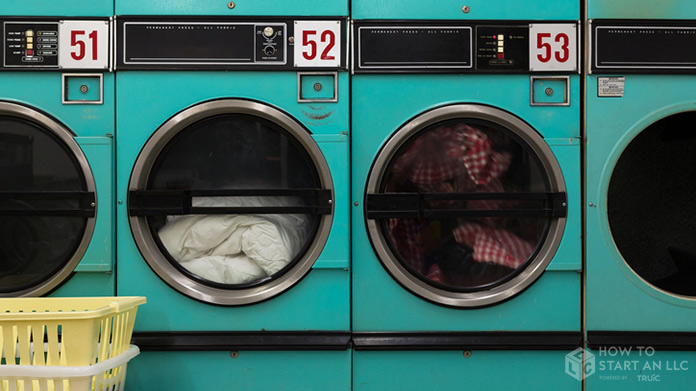The Laundromat Purchasing Guide

Make smart decisions when purchasing equipment for your Laundromat. Learn about the equipment you will need, typical costs, and where are the best places to buy it.
Most Laundromat owners will need the following equipment to get started:
|
|
* = not mandatory
You should plan to budget somewhere between $40,000 and $80,000 for initial purchasing costs.
Sample List of Purchases
A typical person looking to purchase equipment for a laundromat might make the following purchases:
|
|
|
Grand Total: $55,355
Here are some of the most important buying decisions that your laundromat business will have to make. We outline the key considerations you’ll need to keep in mind when making these purchases and provide some popular options.
Considerations When Buying a Washer
Washing Machine Style
Top Loading Machine
Top load washing machines have been popular in the mainstream market for decades. They have low initial costs, with faster wash and rinse cycles that save your customers time. There is also the added convenience of adding clothes into the machine after it starts.
However, top load washing machine use more water and energy to complete each cycle. Also, the capacity of each load is typically smaller than front load machines.
Another drawback is that top load washing machines retain more water after the wash and spin cycle, causing clothes to take a bit longer to dry afterwards. Furthermore, due to the central agitator, top load machines may cause a bit more wear and tear on more delicate fabrics.
Front Loading Machine
A front load washing machine is the most efficient option, as it will automatically determine the level of water that matches your amount of laundry, which could save up to 50% of your water usage per cycle. You can also purchase large capacity front loading machines that hold up to 4.5 cubic feet.
Without an agitator, front load washers feature a gentler wash that is less likely to tear fabric. The high speed spinning cycle of front load washers also shortens drying time.
Another advantage of front load washers is that they are stackable and can save space in your laundromat.
A few disadvantages are that front load washing machines have a higher initial cost, and they also feature longer wash/rinse cycles that usually take more than 30 minutes.
Loads/washer capacity
A typical standard washer that has capacity between 3.1-4.0 cubic feet would load 12-16 pounds of clothes, while larger capacity washers between 4.2-4.5 cubic feet can easily fit 20 pounds or more. There are also mega-capacity washers that have a load capacity of more than 4.6 cubic feet.
Depending on your location and the size of your laundromat, you may want to offer several washer sizes to serve the different needs of your customers.
Coin or Card Operated Machines
Coin-operated machines are the most conventional choice for laundromat businesses. However, they can sometimes pose security risks. Lock-picks and other mischievous customers may find ways to get free wash cycles, or steal all the coins from some of your machines.
If you do choose to have coin-operated machines, you will also need to provide one or two change machines.
Card-operated laundry machines offer people a greater convenience, and are also a much more secure option. Card-operated machines also keep track of your business cashflow online.
The major drawback is that a card reader system can cost a lot to install.
Laundry Room Size
If your laundromat room is small, consider investing in stackable washer and dryer units, which will utilize the vertical space available in your laundromat.
Energy Efficiency
If you care about your utility bill and energy conservation, consider buying a washer that has the “Energy Star” label. This label is given to appliances that pass EPA testing on energy efficiency, which would save energy and money in the long run.
Considerations When Buying a Dryer
Here are some important factors to keep in mind when purchasing dryers for your laundromat:
Electric vs. Gas Dryers
For the conventional electric dryer you need an 240 volt outlet, and for gas dryers you will need a gas line installed into your laundromat room.
Gas line installation can be expensive, and they are dangerous if not properly installed. Most laundromats opt for electric dryers unless a gas line is easily accessible.
Load Capacity
In general the capacity of the dryer should be about twice the capacity of the washer to leave enough room for clothes to dry. Full-size dryers ranges from 5.5 to 7 cubic feet, while mega-capacity dryers can be up to 9.2 cubic feet.
Warranty
Commercial-use washers and dryers will be handling heavy loads of laundry on a daily basis. Therefore it is important to choose brands that have a good reputation and that offer a warranty in case any of the parts breaks down.
There are many online suppliers of laundromat equipment. Here are some brand names in the industry that you may consider buying directly from their website if it's within your budget.
The most popular brand for commercial laundry is Speed Queen Commercial.
Other known brands for commercial washers and dryers include:
- Whirlpool Commercial Laundry
- Maytag Commercial Laundry
- Dexter Vended Laundry
- LG Commercial Laundry
- Electrolux Coin-op Laundromat
- Huebsch Vended Laundry
- UniMac Light Commercial Laundry
- American Dryer Coin Operated
Alternatively, you can look through other online suppliers beyond just the brand names. As a general rule, these sites are less reputable so be careful when negotiating a deal.
Next Steps
Find out more about what goes into starting and running a laundromat
Protect your personal assets from unexpected legal claims. Consider structuring your business as an LLC.
Sign up at our Business Center to access useful tools for your business.